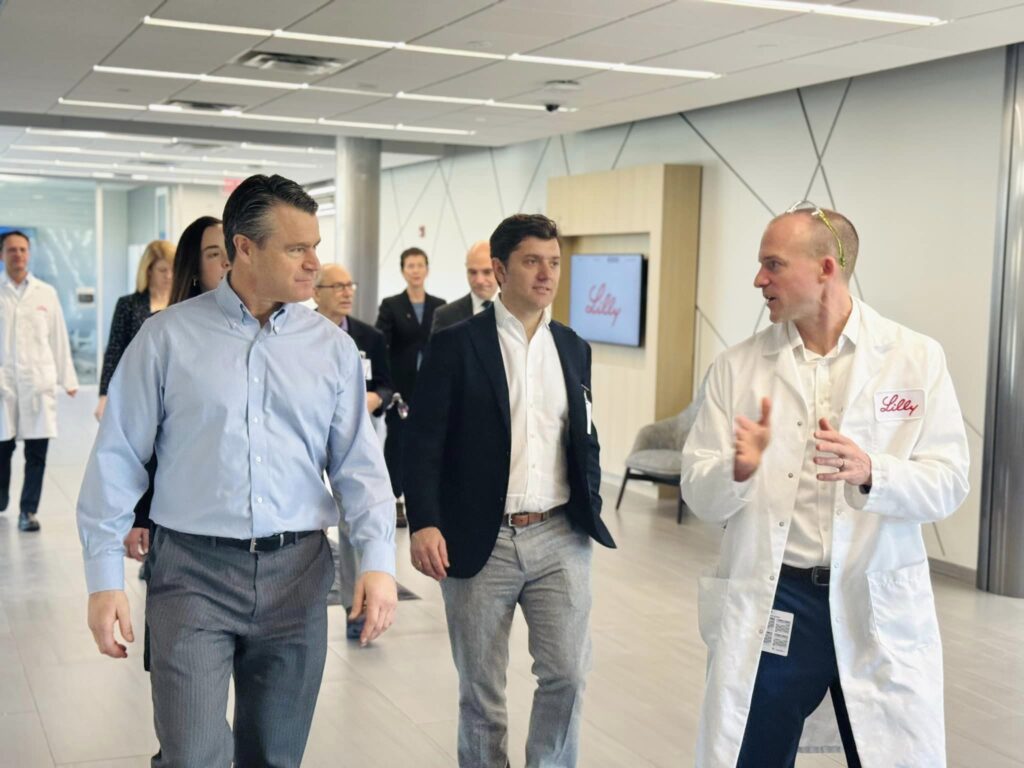Sen. Todd Young (R-IN) was recently named Chair of the National Security Commission on Emerging Biotechnology (NSCEB), established by Congress to recommend policy on biotech and national security. Bio.News spoke to him in an exclusive interview about the work of the commission, the BIOSECURE Act and PASTEUR Act, and more.
Bio.News: You’ve been involved with the NSCEB since its inception. How would you assess the work of the Commission so far?
Sen. Young: The Commission’s work to date has been outstanding. Our Interim Report released late last year did an excellent job of laying the groundwork for our research and forthcoming policy recommendations. More than a few of our early policy ideas have been incorporated in proposed legislation, including the 2024 National Defense Authorization Act (NDAA) and its intelligence counterpart, the 2024 Intelligence Authorization Act (IAA). Some policy options that the Commission authored have been introduced in Congress as standalone bills as well, including the Agriculture and National Security Act of 2024, the Agricultural Biotechnology Coordination Act of 2024, and the Biotechnology Coordination Oversight Act of 2024. I introduced those three with Senator Alex Padilla, who is also a Commissioner.
The next stage of our work is to deliver a final report to Congress that includes actionable policy recommendations. We have engaged with industry, academia, and policy experts to develop options that will clearly define the steps the United States Government should take to benefit from emerging biotechnologies in the years to come.
Bio.News: Has the existence of the NSCEB served to bring more attention to the nexus of biotech and national security?
Sen. Young: Yes, without a doubt. Much of the public and, frankly, some lawmakers and their staff, probably hear “biotech” and they might think about the medicine on their bathroom counter. What we want them to know is that biotech is that, but also so much more. It touches every critical sector that Americans rely on, even if they don’t know it. Biotechnology is used in growing our food, creating our medicine, building more resilient infrastructure, and even healing, fuelling, and equipping the men and women on the front lines of our national security.
We’ve brought some attention to this intersection with the Commission-authored bills in Congress and through our engagement with industry and academia and we plan to keep going. The Commission imagines a future in which the public understands biotech and engages with it every day the same way we do with computer technology now. That’s why having a bioliterate public and a government ready to embrace biotech is so important.
Bio.News: One of the most recent actions regarding national security and biotech was bipartisan passage of the BIOSECURE Act in the House. How do you feel about the content of that legislation? What are the possibilities for passage in the Senate?
Sen. Young: I was encouraged to see this bill pass the House because we need to do more to both protect our sensitive health care data and keep the Chinese Communist Party from infiltrating the American health care system. I support the bill’s goal of preventing American taxpayer dollars from going to biotechnology companies that are owned by and answerable to the Chinese Communist Party or other foreign adversaries. It also would prohibit federal dollars from being used to procure, obtain, or use biotech equipment or services from such companies.
I really view this as a national security bill, and I hope we can find time to get it done before year’s end. If not, this should be a priority issue for the 119th Congress.
Bio.News: You are a sponsor of the PASTEUR Act. Can you talk about the importance of that legislation for national security and the advancement of biotech?
Sen. Young: Antimicrobial resistance has become a growing crisis in recent years. According to the CDC, more than 2.8 million antibiotic-resistant infections occur in the United States each year, and at least 35,000 people die as a result.
Market failures have resulted in a lack of needed research and development in this field which is a threat to public health. I’ve joined with Senator Michael Bennet (D-Colo.) on the PASTEUR Act to encourage innovative drug development targeting the most threatening infections, improve the appropriate use of antibiotics, and ensure domestic availability of antibiotics when needed. The proposal would establish a subscription model to encourage innovative antimicrobial drug development aimed at treating drug-resistant infections. This model will be fully delinked, meaning that participating developers would not receive income, as a part of their subscription payments, based on volume or quantity of sales.
Americans understand that we must take every reasonable and responsible measure to prevent future public health crises, both to better protect our people and ensure we aren’t reliant on our other countries for critical medications.
Bio.News: In June you introduced the Biotechnology Oversight Coordination Act, to streamline regulation and the Synthetic Biology Advancement Act to establish a National Synthetic Biology Center. Both these bills were apparently inspired by the NSCEB’s interim report, can you talk about why these bills matter for national security and the advancement of biotech?
Sen. Young: Biotechnology presents tremendous opportunities for life sciences, manufacturing, agriculture, defense, and many other fields. Preserving America’s leading role in biotechnology is essential for our long-term economic and national security and will open up new opportunities across our nation. We need to accelerate the safe development of new applications for synthetic biology and ensure our regulatory structure is ready for the challenge which these bills would help to do.
Bio.News: What about the PAHPA? Can you describe why that’s important and what needs to be done for passage?
Sen. Young: I don’t serve on the U.S. Senate Health, Education, Labor and Pensions Committee (HELP), which has jurisdiction over this bill, but I will say that generally we all saw how important preparation for a major global health crisis is during COVID-19 pandemic. [The Pandemic and All-Hazards Preparedness Act] was first enacted during the Bush Administration and subsequently reauthorized, and there have been a lot of positives for both our biodefense and response to natural disasters as a result of this program. In addition to incorporating lessons learned from the COVID pandemic, we also should consider how we can incorporate AI and other emerging technologies into our health security.
Bio.News: What are some of your goals for your term as NSCEB Chair? What kind of new initiatives can you envisage?
Sen. Young: My goal as Chair, and the priority of the Commission as a whole, is to educate my colleagues in Congress on the urgency of this moment and show them that turning our recommendations into law is of vital necessity for our nation’s future. We must promote, protect, and prioritize the American biotechnology industry in the interest of maintaining a strong industry and global leadership and in the interest of our national security. This is the Age of Biology and if the United States is going to lead in this age with our values and our market, we must lay the groundwork with policies that bolster innovation, foster industry growth, and support the safety and security of Americans.
Bio.News: It seems that many of the NSCEB’s priorities have bipartisan support. Do you anticipate being able to move forward after elections?
Sen. Young: I hope so. It’s a little hard to predict what the legislative environment will look like in the months ahead, but I am optimistic and will be doing my part to advance our bills.
Bio.News: Is there anything else you’d like to add?
Sen. Young: I’m really proud of the work being done in my home state of Indiana on these issues. Earlier this year, I invited fellow commissioners on the NSCEB for a series of events in Indiana. We conducted fact-finding meetings at Indiana University Indianapolis, Purdue University, Eli Lilly, and West Lafayette seed design company Inari, and we were joined by leaders from business and academia across the state. I was pleased that my fellow commissioners had the opportunity to hear directly from Hoosiers about how Indiana is leading the way on these issues and how all of America—not just the coasts—can make a huge impact in the tech sector.
Photo: Sen. Young toured Eli Lilly and Company’s bio manufacturing facility in Indiana with NSCEB Commissioners. (Source: Sen. Todd Young Facebook)




